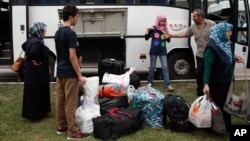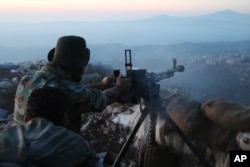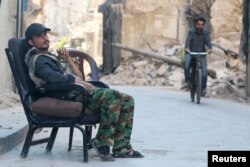Turkish officials say 50,000 refugees have left the Syrian city of Aleppo and are heading to the border, but it remains unclear whether they will be allowed to enter Turkey after a hazardous journey dodging airstrikes and negotiating checkpoints manned by disparate rebel militias, including al-Qaida’s affiliate in Syria.
For months now border gates have been officially closed to new refugees, and those fleeing are forced to pay smugglers to enter illegally - sometimes using tunnels to escape the killing fields.
The rich can bribe border-gate guards — the going rate is $700 per person — the poor may get across after paying smugglers $50 to $100 per person to sneak past Turkish border guards patrolling farm-fields and olive-tree orchards adjacent to the border.
Russian airstrikes and a Syrian army ground offensive mainly in the countryside to the south and east of the city of Aleppo have triggered the surge in Syrians heading for the border. Syria Turkmen Council President Abdurrahman Mustafa said he also estimates about 50,000 people have left the city and are picking their way down pot-holed roads, through checkpoints and past ruined villages to Turkey.
“A major migration has started from the south of Aleppo,” he said.
An arduous journey
The 68-kilometer journey from Aleppo to the Turkish border has become a dangerous undertaking. What would take an hour to drive before the war can take up to two days to navigate now with holdups caused by fierce bombing raids, flare-ups in fighting and checkpoints.
“It is hard because of different factions on the road,” said Ahmed, a student who accompanied his sister and her three children ranging in age from eight to 14 years old.
The lanky, dark-haired Ahmed draws heavily on a cigarette as he explains that they had to take a roundabout way to reach the Turkish border town of Kilis, first heading northwest from Aleppo for the mainly Kurdish border town of Afrin, hoping to sneak across the border there, and when failing, finding someone to drive them east through villages that are being targeted by regime airstrikes as well as ground attacks by Islamic State militants.
“There were a lot of checkpoints,” he said. “Free Syrian Army, the regime, Daesh (the Arab acronym for IS), Jabhat al-Nusra — they are all on the road,” he adds.
“We slept where we could on the street,” he told VOA. He said his 32-year-old sister, a former accountant, is still recovering from a breast cancer operation but is short on the medication she needs. The family is originally from the east of Syria, from Deir ez-Zor, but fled from there more than two years ago.
Europe, Turkey trading blame
In nearby Gaziantep, officials from a variety of European countries are monitoring the situation - trying to work out whether the Turks will allow the refugees to enter en masse and how that might impact Europe’s migration crisis.
“With winter weather due to set in over the next month, the numbers heading for Europe are likely to lessen substantially,” said a European diplomat, who asked not to be identified for this article. “But the numbers will pick up again, I think, by March next year so we have until then to start structuring properly how we will cope and introducing an orderly, humane process,” he added.
He places much of the blame for the war refugees heading to Europe in ever greater numbers on the Turks.
“They have partly manufactured this crisis. Since January they have insidiously and incrementally made life harder for refugees here — denying them residency, making it difficult for them to work, blocking them from opening businesses. Of course, many of the refugees would have been thinking of heading west, to Europe, but in recent months the message from the Turks has been clear: Get Out,” he said.
In recent weeks, Turkish authorities have introduced a series of new regulations, requiring refugees to secure permission to fly domestically or for travel between Turkey’s provinces.
Turkish officials bristle at the accusation they are manufacturing the crisis, saying they are the ones on the front line and have been largely left to shoulder the refugee burden with inadequate assistance from Europe, which expects Turkey to be the EU’s buffer zone against the huge refugee flow.
Another European official based in the Turkish capital of Ankara vented his frustration to VOA about the European Union’s reaction so far to the tens of thousands of refugees entering the bloc. “We have been speaking with several voices and not one unified voice and working against each other, not with each other,” he said. “We have four months or so to get our act together before the flood picks up again.”
Some refugees return to Syria
For some refugees the difficulty of life in Turkey means heading not west, to Europe, but south, back to war-wracked Syria, braving checkpoints and air-raids once again. Ibrahim, a rural worker from the Aleppo countryside, and his brothers worked illegally on the harvests this summer in Turkey but they along with their wives and five children are heading back to Syria.
“We have not been able to find work, we have nowhere to live and not enough money,” the farmer explained.
With a pile of burlap bags fall of spare clothing and cooking utensils, the disheveled extended family waited at the bus station in Kilis, a town that has doubled in size since the outbreak of the civil war, hoping to find a pick-up truck driver to ferry them for a few lira to the border for their trek back to an uncertain future.






